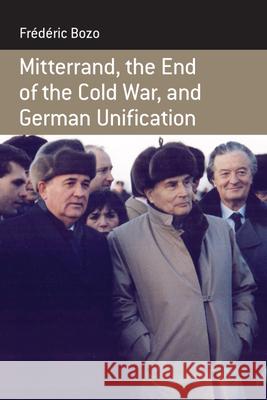Mitterrand, the End of the Cold War, and German Unification » książka
Mitterrand, the End of the Cold War, and German Unification
ISBN-13: 9781845457877 / Angielski / Miękka / 2010 / 450 str.
..".telling the story of German unification] primarily from the French perspective provides a more detached yet highly informed account of the diplomacy." - Foreign Affairs "Bozo's masterly book is the definitive study of French President Mitterrand's important, and often denied or dismissed, contribution to German unification and to the reunification of Europe. It is indispensable to anyone interested in these momentous events, in French foreign policy, and -- in the truth." - Stanley Hoffmann, Harvard University "This outstanding study... is obligatory reading on the end of the East-West conflict and on German unification. It is exceptionally well researched and based on largely untouched sources." - Karl Kaiser in Internationale Politik "Twenty years ago when the Berlin Wall fell, many feared that the reunification of Germany might bring back Europe's old ghosts, especially the rivalry between France and Germany. This book, written by one of Europe's outstanding contemporary historians, demonstrates the central role played by French president Francois Mitterrand in furthering German reunification and forging a new architecture for.post Cold War Europe. Based on a rich body of primary source material, Bozo carefully and persuasively challenges prevailing American narratives, and makes a powerful case for the ultimate triumph of Mitterand's vision. It is essential reading for scholars hoping to understand the historical background to Europe's increasing assertiveness and independence from the United States." - Thomas A. Schwartz, Vanderbilt University Twenty years after the fall of the Berlin Wall, this important book explores the role of France in the events leading up to the end of the Cold War and German unification. Most accounts concentrate on the role of the United States and look at these events through the bipolar prism of Soviet-American relations. Yet because of its central position in Europe and of its status as Germany's foremost European partner, France and its President, Francois Mitterrand, played a decisive role in these pivotal international events: the peaceful liberation of Eastern Europe from Soviet rule starting in 1988, the fall of the Berlin Wall and Germany's return to unity and full sovereignty in 1989/90, and the breakup of the USSR in 1991. Based on extensive research and a vast amount of archival sources, this book explores the role played by France in shaping a new European order. Frederic Bozo is currently Professor in contemporary history and international relations at the Sorbonne (University of Paris III, Department of European Studies). He was previously professor at the University of Nantes (1998-2005) and associate professor at the University of Marne-la-Valle (1994-1998). Born in 1963, Frederic Bozo was educated at the Ecole normale superieure, at the Institut d'etudes politiques de Paris and at Harvard University. He received his doctorate from the University of Paris X - Nanterre (1993) and his habilitation from the Sorbonne - Paris III (1997). His research field is French foreign and security policy, transatlantic relations and Cold War history.
"...telling the story [of German unification] primarily from the French perspective provides a more detached yet highly informed account of the diplomacy." · Foreign Affairs
"Bozos masterly book is the definitive study of French President Mitterrands important, and often denied or dismissed, contribution to German unification and to the reunification of Europe. It is indispensable to anyone interested in these momentous events, in French foreign policy, and -- in the truth." · Stanley Hoffmann, Harvard University
"This outstanding study... is obligatory reading on the end of the East-West conflict and on German unification. It is exceptionally well researched and based on largely untouched sources." · Karl Kaiser in Internationale Politik
"Twenty years ago when the Berlin Wall fell, many feared that the reunification of Germany might bring back Europes old ghosts, especially the rivalry between France and Germany. This book, written by one of Europes outstanding contemporary historians, demonstrates the central role played by French president François Mitterrand in furthering German reunification and forging a new architecture for.post Cold War Europe. Based on a rich body of primary source material, Bozo carefully and persuasively challenges prevailing American narratives, and makes a powerful case for the ultimate triumph of Mitterands vision. It is essential reading for scholars hoping to understand the historical background to Europes increasing assertiveness and independence from the United States." · Thomas A. Schwartz, Vanderbilt University
Twenty years after the fall of the Berlin Wall, this important book explores the role of France in the events leading up to the end of the Cold War and German unification. Most accounts concentrate on the role of the United States and look at these events through the bipolar prism of Soviet-American relations. Yet because of its central position in Europe and of its status as Germanys foremost European partner, France and its President, François Mitterrand, played a decisive role in these pivotal international events: the peaceful liberation of Eastern Europe from Soviet rule starting in 1988, the fall of the Berlin Wall and Germanys return to unity and full sovereignty in 1989/90, and the breakup of the USSR in 1991. Based on extensive research and a vast amount of archival sources, this book explores the role played by France in shaping a new European order.
Frédéric Bozo is currently Professor in contemporary history and international relations at the Sorbonne (University of Paris III, Department of European Studies). He was previously professor at the University of Nantes (1998-2005) and associate professor at the University of Marne-la-Valle (1994-1998). Born in 1963, Frédéric Bozo was educated at the Ecole normale supérieure, at the Institut détudes politiques de Paris and at Harvard University. He received his doctorate from the University of Paris X - Nanterre (1993) and his habilitation from the Sorbonne - Paris III (1997). His research field is French foreign and security policy, transatlantic relations and Cold War history.











